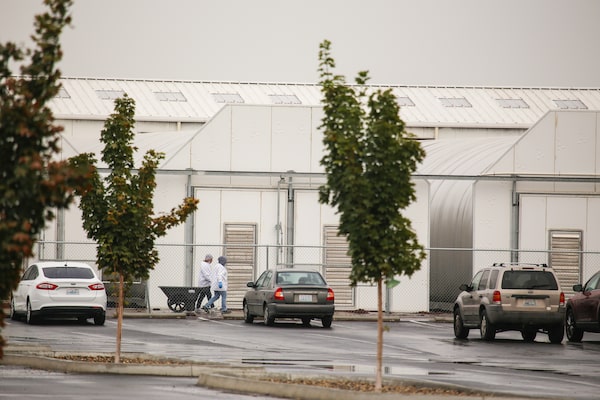
Half a dozen Workers at Windmills Farms, which is owned by Toronto-based Instar Asset Management Inc. and located in Sunnyside, Wash., have filed a lawsuit alleging the company has stymied efforts to establish a union at the site.Nathan Vanderklippe/The Globe and Mail
A half-dozen Washington-state agricultural workers filed a lawsuit Tuesday against their mushroom farm’s Canadian owners, saying employees attempting to organize a union there have been harassed, singled out for mistreatment and in some cases terminated.
The lawsuit, which seeks financial damages and a court order protecting union supporters from discrimination, marks a new attempt to exert pressure on Instar Asset Management Inc., the Toronto-headquartered company that owns the farm, known as Windmill Farms. It is also an effort to advance the cause of organized labour in a country where agricultural workers in most states have for many decades been deprived of the collective bargaining rights that exist in other industries.
“There’s been a lot of effort put into holding this company accountable, and that will continue until such time as Windmill recognizes the union,” said Antonio De Loera-Brust, who leads communications for the United Farm Workers. The UFW has led a unionization drive for the mushroom workers.
The organizing effort at the mushroom farm comes at a moment of new strength for labour in the U.S., and the mushroom workers have already counted some wins. Earlier this year, the Washington state attorney-general ordered the farm to pay US$3.4-million, after employees filed a lawsuit against the farm’s previous ownership that documented unfair, deceptive and discriminatory actions, including against female workers.
But the fact that the mushroom workers have not succeeded in unionizing underscores the difficulties in extending the broader labour momentum – with recent wins for U.S. auto workers, screenwriters, package deliverers, baristas and others – into sectors that have long resisted collective representation. Only 4.3 per cent of U.S. agricultural workers belong to unions, less than half the average among working-class Americans.
Washington law, like the law in most U.S. states, makes it nearly impossible for farm workers to unionize without the agreement of their employer. Windmill Farms and its previous owners are under no obligation to recognize a June, 2022 unionization petition by workers at the mushroom farm, which is located in Sunnyside, a small agricultural centre in the Yakima Valley.
Instar bought the farm in February. Windmill chief executive Ed Carolan declined to comment this week on the lawsuit.
In interviews earlier this year, he and other executives said they had made, and continued to make, investments in improving working conditions and boosting morale. The company has said workers have no need of a union.
“Windmill Farms demonstrates best practices in all facets of its business and operations,” Mr. Carolan wrote in a September e-mail. “Most importantly, our company is committed to putting people first.”
But from the perspective of workers, things have “only gotten worse,” said Andres Munoz, an attorney with Columbia Legal Services who is representing some of the mushroom farm employees. The lawsuit demands a halt to the use of production quotas to discriminate against some workers, an end to workplace surveillance of certain employees and an end to separating union supporters from one another in order to stop them from discussing workplace concerns.
“We believe that clients have the right to press for a union,” Mr. Munoz said. The lawsuit is an attempt “to protect that right.”
Lawyers declined to make the six workers suing the company available for interviews. Three of them remain employed there. The lawsuit relies largely on testimony from those employees and describes their experiences working under the Canadian company, which, the suit claims, fired all the farm’s workers after taking possession of the business, then offered them new jobs.
But the new offers for some union supporters and workers on medical leave were for “positions performing work they had never performed before or which they were unable to perform due to a workplace injury,” the lawsuit claims.
Other union supporters reported being separated into different crews, mocked by management, assigned to picking rooms with fewer mushrooms, denied time off to attend union events, reprimanded for raising workplace dangers and subjected to regular surveillance.
Rachel Erstad, research co-ordinator at the University of Washington’s Harry Bridges Center for Labor Studies, said the workers’ fight for a union has shown the need to reform the U.S. National Labor Relations Act, which excludes agricultural workers from collective bargaining rights – a provision written at a time when farms tended to be smaller than the corporate entities that dominate food production today.
“Could this farm in the Yakima Valley be really instrumental in creating that change? I think that’s very possible,” she said.